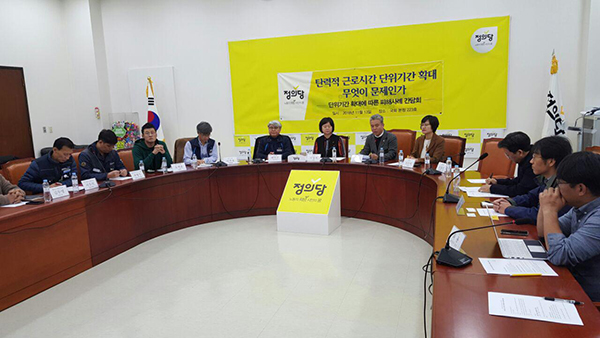
Since July this year, the 52-hour workweek(including 12 hours of extended work) has been implemented at the public institutions and workplaces with more than 300 employees. The labor and management in the IT industry have been looking for agreeable solutions for the reduction of working hours. The IT industry notoriously known for the long working hours and the comprehensive wage system was moving to cut the working hours through the selective working hour system in accordance with Article 52 of the Labor Standards Act which is designed to increase the flexibility in working hours. The clock-in and clock-out at employees' discretion reflecting the characteristics of the IT industry was adopted to discourage the weekly working hours from exceeding 40 hours per week. When the weekly hours exceed 40 hours, allowances for extended work are paid to the workers. Naver and Kakao are currently implementing the system. Nexon and Smilegate have also adopted the selective working hour system set up with core time during which all employees must be at the office. Despite some problems reported in computation of extended work hours, employees' response to the selective working hours system in the IT industry is known to be positive in general.
However, the expanded unit period of the flexible working hour system(not more than 3 months at the moment) that the government and the political circle of the ruling and opposition parties push for seems to dash cold water on a soft landing to cut the working hours by the IT industry.
Oh Se-yoon, President of Naver Union Local said that "we have not fairly got paid due to the comprehensive wage system before the implementation of the 52-hour workweek system and since then the labor and management in the IT industry have been looking for solutions to the problem through the selective working hour system," and denounced that "the government and the political circle attempt to introduce a bad system, only listening to the employers' views."
Im Young-gook, General Secretary of the Korean Chemical, Textile and Food Workers' Union(KCTFU) predicted with his concern that "when the unit period of the flexible working hour system is expanded, unionized workplaces may slow down the process but the balance between work and life that the newly amended Labor Standards Act aimed to achieve will disappear at non-union workplaces."
Kim Doo-young, President of the Broadcasting Staff Union Local of the Hope Solidarity Union said that "broadcasting companies did not take any action to resolve (the long working hour problem) even after a young staff died from overwork this summer, but only recently an atmosphere of dialogue has been created," and expressed his frustration that "the government and the political circle (ignorant of the reality) are playing politics behind the curtain."
As KCFTU General Secretary Im Young-gook said, there are rising concerns that non-union workplaces or workplaces with weak labor union representation will be adversely affected to a large extent by the expanded unit period of the flexible working hour system, According to Article 51 of the Labor Standards Act(flexible working hour system), the unit period of not more than two weeks in accordance with rules of employment and the unit period of not more than three months by an agreement in writing between an employer and a workers' representative are allowed.
According to the flexible working hour system, the allowance for extended work hours exceeding 40 hours a week is not a statutory pay. Furthermore, the Ministry of Employment and Labor does not come up with a clear administrative interpretation on the case that when the flexible working hour system is modified through a change in the rules of employment, whether or not it falls under the purview of the preparation of and amendment to the rules of employment unfavorable to workers. In such a case, an employer has to seek a consultation of a majority labor union, if there are labor unions, or of the majority of the workers in the non-union workplace.
Lee Hoon, a labor attorney to the Justice Party said that "when the flexible working hour system is to be implemented, the law should make clear the conditions as to the agreement of the majority of the workers, the election time schedule and procedure of workers' representatives which are required for the changes in the rules of employment unfavorable to the workers."
reported by Kim Hak-tae
translated by Kim Sung-jin

